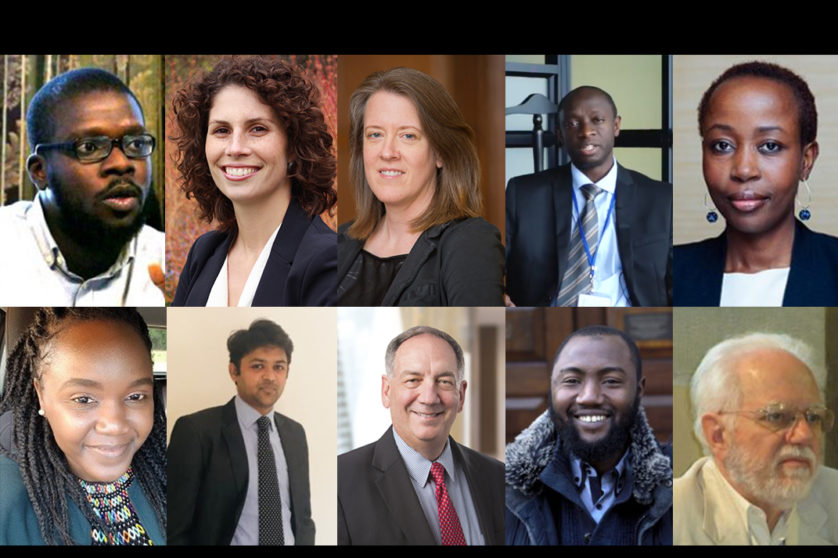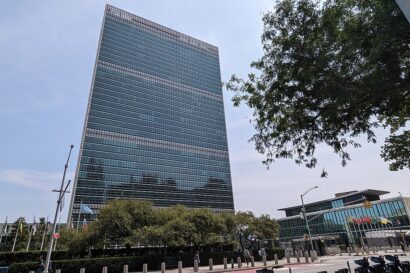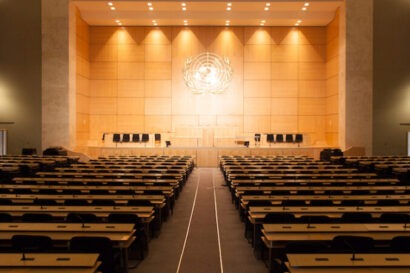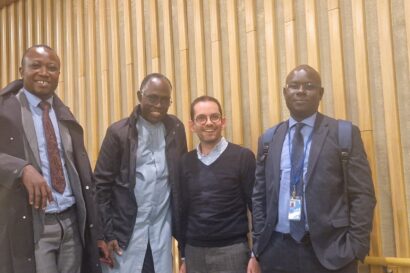The OECD secretariat recently proposed a “stock taking exercise” to “re-examine how international tax rules currently meet the needs of developing countries” leading potentially to a “new deal on international taxation as part of the international effort to rebuild economic life in the post Covid-19 era.” The OECD’s Pascal Saint-Amans has suggested that this may be a third pillar, in addition to the two-pillar global negotiation process currently underway.
We asked recent ICTD contributors on international tax for their ideas and suggestions for what a ‘new deal’ should look like for developing countries, and received ten submissions from writers on four continents:
Alexander Ezenagu
Assistant Professor of Taxation and Commercial Law at Hamad Bin Khalifa University, Qatar
The OECD’s quest to work on a ‘new deal’ for developing countries is welcome, however, the potential standoff of ring-fencing a group of countries from others must be thoroughly considered. Having stated that, any ‘new deal’ should consider the following options. A broad transfer pricing safe harbour regime for its most important economic sectors as a form of ring-fencing and protection. Such a regime may be the unitary taxation and formulary apportionment approach, the alternative corporate minimum tax and/or the increased use of withholding taxes. These allocation formulae should curb the tax avoidance practice of multinational enterprises (MNEs), while ensuring that developing countries are able to tax profits with nexus to their jurisdictions. Also, work on minimum global tax rates for corporate profits and other payments must be considered an integral part of the ‘new deal’. As observed, the tax avoidance practices of foreign companies are encouraged by taxing jurisdictions with harmful preferential tax regimes, such as low-tax corporate income tax rate, no or low-tax rates for certain payments and poor regulatory standards. Finally, a one-size fits all approach must be abandoned as it is impractical and any ‘new deal’ must base its foundation on the theory of economic allegiance and other sound theories.
Alexandra Readhead
Lead, Tax and Extractive Industries, IGF/IISD
The extractive industries are often left out of global tax reforms. That is because source-based taxation is considered the most appropriate model of taxation for natural resources, which are location-specific. The intuition is right: resource-rich countries should get the lion’s share of the fiscal benefits from resource extraction. However, the problem, according to many governments, is that they are not benefiting. Instead, extractive companies have many ways to avoid paying tax. A ‘new deal’ calls for a fundamental re-think of how governments should benefit financially from the exploitation of their finite, non-renewable resources. How can the dominant fiscal regimes for mining, based on royalties and income taxes, be improved in their design or implementation? Sliding scale royalties, administrative pricing, and preferred shares are some of the possibilities. But incremental change may only get us so far. Are there more radical options available to resource-rich countries to increase the returns from their mineral wealth? Production sharing regimes, gross-profit splits, or formulary apportionment to name a few. At the Intergovernmental Forum on Mining, we are excited to begin to answer these questions together with ATAF, CIAT, ICTD, and partners. ‘The Future of Resource Taxation’ is at the heart of the global tax agenda for developing countries.
Allison Christians
H. Heward Stikeman Chair in the Law of Taxation at McGill University
The old deal on tax sits on a foundation of shaky assumptions about what creates value. When these assumptions ended up shifting tax revenue out of rich countries and into small island jurisdictions, the OECD acted decisively. When these assumptions end up shifting tax revenue out of less wealthy countries and into OECD countries, there appears to be relatively much less commitment to action. It is well past time to undertake a holistic reconsideration of how we define, measure, and allocate value for tax purposes.
The OECD is implicitly working on this idea in its program of work on the digitalisation of the economy, and it could significantly adjust its scope to create a ‘new deal’ for developing countries in two ways: (1) in the immediate term, by introducing Pillar 3: a global excess profits tax to meet the needs of Covid-19 and beyond (built on the principles of Pillars 1 & 2 and discussed here), and (2) for the longer term, by internalising costs associated with social and environmental risks within profit allocation rules (floated at the inaugural Platform for Collaboration on Tax conference here, explained here and presented in more detail here).
The OECD is not the institution that I would have chosen to work on a new deal for developing countries on tax, but as its continued dominance currently seems inevitable, I would especially encourage it to work hard on governance. Having created the Inclusive Framework, the OECD has taken on the herculean task of designing a governance structure that enables meaningful participation of all countries yet delivers results. The Inclusive Framework should not be primarily a stamp of approval on ideas formed by the OECD Secretariat under mandate by the G20. Instead, the Inclusive Framework should be doing the mandating to the OECD Secretariat, or it should have a Secretariat of its own and split off from the OECD.
As such, my second piece of advice to the OECD on designing a new deal for developing countries is to immediately strike a working party on governance for the Inclusive Framework, populate it with governance experts across the Inclusive Framework membership, and heed its advice going forward.
Anthony Kibirige
Transfer Pricing Team Leader, Uganda Revenue Authority
Without doubt, developing countries have gained from the enhanced transparency under the OECD Global Forum. In particular the adoption of the automatic exchange of information standard provides broader scope for developing countries to claw back some resources kept in offshore banks by their residents. Above the immediate taxation benefits, this promotes better governance and accountability to the citizenry.
While the base erosion and profit shifting (BEPS) process and by extension the work of the inclusive framework on taxation of the digital economy create certainty for taxation of MNEs and square up tensions among countries in the global North respectively, developing countries might not stand to reap many tangible gains from these initiatives. By and large, the debate between source and residence countries is still rife and at the heart of any future discussions, as well as the concessions that will be necessary to reach a consensus. One of the ways in which source countries could be supported going forward is in how they can bargain better and achieve a fair share from the value created by the commodities they originate. Developing countries have always wanted to bring to the table a more comprehensive debate on the taxation of commodities, and hence future tax debate should gravitate towards this.
Catherine Ngina Mutava
Associate Director of the Tax Research Centre, Strathmore University
Though all countries experience the challenges occasioned by BEPS, developed and developing countries experience them differently. Developing countries have for long argued that services are a major source of profit shifting due to the relative ease with which services can be shifted to different jurisdictions. Payments for services are deductible in the source country and reduce the taxable profits of the entity paying them. This has been further compounded by increased digitalisation. Despite this, the BEPS process has not specifically addressed this from the perspective of developing countries. The attempts to deal with it under Action 1 of BEPS has resulted in proposals that set a high threshold for digital companies to be taxed in the source country. The high threshold is unlikely to be met by any company operating in any developing country. In tax treaties, Article 7 of the OECD Model allows source countries to tax such income only where the entity has a permanent establishment (PE) in the source country. Owing to the nature of services, it is relatively easy to circumvent the need for creation of a PE through the use of various group companies in the case of multinationals. This is especially so since there is no provision for a service PE under the OECD Model Convention.
The UN attempted to address the BEPS challenge posed by services by including Article 12A in its Model Convention. The Article allows for source countries to tax income from technical services through a withholding tax levied on the gross payments. Attempts by many developing countries to include Article 12A in treaties negotiated with OECD countries has met resistance. The UN Model has also included Article 5(3)(b) which recognises service PE. Despite this, as already mentioned, the nature of services makes it easy to avoid creating a PE. Thus, despite the efforts by the UN, taxing services remains a challenge for developing countries. There is, therefore, need for globally accepted anti-abuse provisions that effectively prevent the shifting of profits from developing countries using services.
Joy Ndubai
Tax researcher and doctoral candidate in international tax
Coordinated action at the global level is perhaps an even more sensitive topic than it was before the Covid-19 crisis. More than ever, the structure and implementation of tax systems will be based on the information available to tax authorities, the resources available to collect taxes, and on multinational taxpayers themselves: how transparent they are, and what kind of presence they have in an economy. As a result, global negotiations regarding the digitalisation of the economy are likely to experience some drawbacks: countries need to move fast, and unilateral policymaking, particularly the introduction of Digital Services Taxes, will be faster than multilateral efforts. Of course, international support to developing countries could prove highly useful, but it must be informed through a shared platform that values the input made by non-OECD countries. It cannot take the same form as it has in the past. Time should be taken to evaluate and respond to the unique features of the systems within developing countries, such as the prevalence of mobile money taxes and social media taxes. For this initiative to achieve success, more effort will be required to align and improve some of the core elements of tax and financial transparency systems to effectively respond to the challenges raised by illicit financial flows (IFFs) at domestic and international levels. Finally, perhaps it is time to now hold developed countries accountable for their role in housing the illicit wealth and proceeds of aggressive tax avoidance and create better structures to support the recovery and repatriation of that wealth to the developing countries that need it most.
Lakshmi Narayanan
Indian Revenue Services Officer (written in a personal capacity)
The proposed ‘new deal’ for developing countries by OECD needs to more ambitious. The existing deal focuses on training programs, capacity building, toolkits and resources. Furthermore, the actions are targeted on a few sectors of economy such as extractive industries, and even here they have only a marginal impact. The only exception to the above is the tax transparency measures through the exchange of Information program. The ‘new deal’ has to move away from old paradigms and make bold new promises:
- Engage regional institutions as equal partners, allowing them political space to shape the global tax agenda.
- Focus on issues relevant to developing countries such as tackling low tax compliance, domestic revenue mobilisation plans, management of international tax debt and litigation, and protection of source taxation in international tax matters.
- Develop a strategy for digitisation of all National Tax Administration through use of technology to increase efficiency across all domains of tax such as: filing; accounting; third party reporting; auditing; risk assessment; revenue forecasting; tax database creation and tax payments.
- Proactive tax policy to address emerging tax issues owing to disruptive digital technology, such as: cryptocurrency; robotics; 3D printing and space technology, all of which move beyond the platform-based business models that currently dominate international debate.
Michael Durst
ICTD Senior Fellow
Post-Covid corporate tax regimes for developing countries will need to reflect a politically (and ideally carefully) determined balance between (i) the need for reliable government revenues, and (ii) the desire to provide a hospitable environment for corporate investment (including re-investment). This outlook makes it especially important to remedy certain anomalies in transfer pricing administration, which historically have blocked developing countries from collecting revenues at the levels prescribed by the underlying tax laws. If allowed to persist, these anomalies will, as a practical matter, prevent developing countries from realising the revenues budgeted in their post-Covid tax policy balance.
Two such reforms could provide large benefits to developing country tax administrations. Both will require significant work and resource commitments by the OECD, the Platform for Collaboration on Tax, and developing-country revenue administrations, although I think the benefits can far outweigh the likely costs. One area, addressed in a forthcoming ICTD paper, is to relieve developing country tax administrations of the requirement that they attempt case-by-case “comparables” searches when performing tax audits of multinational companies. Experience has shown that even wealthy countries have difficulty meeting this expectation of the transfer pricing rules, and many developing countries do not have the resources even to attempt the required comparables searches. As I discussed in a previous ICTD working paper, the second area for reform is for the natural resources sector. More countries should adopt the approach of Norway, Indonesia and Angola, which use “administrative pricing” for oil extracted by multinational producers and sold to related purchasing companies. Under administrative pricing, the product price is established by an expert panel, eliminating the intractable disputes that arise when a company volunteers its own estimate of an arm’s-length product price, and the tax authority faces the very difficult task of auditing the price after-the-fact. Administrative pricing should be extended from the oil sector to hard-minerals, where difficulties in establishing arm’s-length prices also are very large.
Mustapha Ndajiwo
Executive Director, African Centre for Tax and Governance
The challenges facing developing countries are obvious, as captured by the OECD. I am not sure how useful it is to start a whole new ‘stocktaking’ – all these while there have been peer reviews and studies already showing the challenges developing countries face in trying to implement some of the standards developed by the OECD.
First, the Inclusive Framework under which they intend to pursue this has to be truly inclusive: developing countries should be part of any agenda-setting so that they are not dished something that does not necessarily reflect their needs. The process should not be hastened in such a way that the developing countries aren’t given ample time to put their thoughts and strategies together. In my opinion, some of the key issues they should consider are:
- The G24 proposal under the Inclusive Framework to tax on a formulary basis according to ‘Significant Economic Presence’ should be brought back to the table
- A review of the threshold for country-by-country financial reporting (CBCR) and any other threshold should be done to reflect the realities of developing countries
- Public CBCR should be strongly considered
Sol Picciotto
ICTD Senior Fellow
The G20’s aim for the BEPS project, to tax MNEs where activities take place, points to the need to clarify and strengthen taxation of active business profits at source. This has long been a concern for developing countries, whose tax systems are generally based on taxation of all income arising in or derived from the country. This broad scope of taxation was restricted by international tax rules, although less so in the UN model treaty, which was developed to reflect the viewpoint of developing countries. In practice, many developing countries have found methods to tax income at source, such as withholding taxes. Similar methods have now been introduced by OECD countries as digitalisation of the economy has also affected their tax base. However, such taxes apply to gross payments to non-residents, so they are generally passed on directly to customers, and bear no relationship to profitability. The challenge is to find methods that are simple and easy to administer to allocate the tax base of MNEs fairly among countries where they have activities. For developing countries this is needed for all business sectors, and not just highly digitalised firms. ICTD research explores both short-term and longer-term methods to achieve this aim.




